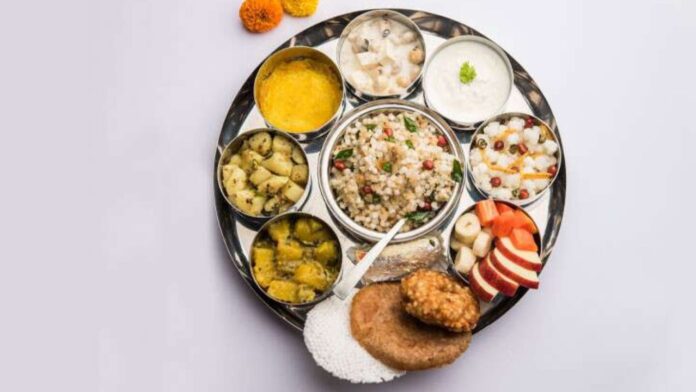Chaitra Navratri fasting commences on April 9th, Tuesday. This nine-day fasting period is dedicated to detoxification, worship of Maa Durga, spiritual reflection, and rejuvenation of both body and mind. The Navratri diet comprises vrat-friendly grains, hydrating vegetables and fruits, nuts, seeds, and millets, all of which are rich in nutrients and nourish the body when consumed in moderation and prepared healthily. However, indulging in deep-fried foods or overeating even satvik foods can lead to weight gain, blood sugar spikes, and exacerbate symptoms of chronic health issues.
It’s essential to maintain a balanced diet during Navratri, incorporating all essential food groups such as high-protein foods, complex carbohydrates, fiber, vitamins, and minerals. Inadequate water intake, insufficient fiber consumption, or lack of hydrating foods can cause digestive issues ranging from constipation to bloating. Fortunately, there are plenty of vrat-friendly foods available to meet daily nutritional needs.
Here are some Navratri foods to include in your diet:
1. Hydrating fruits and veggies: As Chaitra Navratri falls during warmer months, it’s crucial to increase intake of hydrating fruits and vegetables. Oranges, grapes, watermelon, muskmelon, cucumber, and tomatoes provide fiber, vitamins, and minerals, boosting immunity and energy levels.
2. High-protein foods: Incorporating protein-rich foods such as milk, paneer, kuttu atta, and amaranth sustains energy levels and promotes satiety throughout the day.
3. Probiotics like buttermilk and curd: Probiotic-rich foods support gut health, boost the immune system, and enhance energy levels and mood.
4. Millets: Buckwheat, barnyard millet, foxtail millet, and little millet are nutrient-dense options that increase energy levels and prevent weight gain when added to dishes like pulao, soup, or porridge.
5. Potatoes, bottle gourd, pumpkin: Light and easily digestible vegetables like pumpkin and bottle gourd aid in detoxification and rejuvenation, providing essential nutrients and fiber.
6. Makhana and peanuts: Makhana is rich in calcium, magnesium, phosphorus, and potassium, while peanuts provide various vitamins and minerals. Snacking on makhana and peanuts helps curb hunger pangs.
Foods to avoid during Navratri fast:
1. Onion and garlic: Considered tamasic, onion and garlic are omitted from vegetable curries and salads during Navratri fasting.
2. Grains and cereals: Rice, wheat, and lentils are replaced with falahaari foods like samak ke chawal, kuttu ki roti, amaranth, and water chestnut flour.
3. Non-vegetarian foods: Non-vegetarian items like chicken and mutton are strictly avoided during Navratri fasting.
4. Processed or deep-fried food: Deep-fried foods like kuttu ki puri and singhare ke pakore can overwhelm the digestive system and cause acidity and constipation instead of detoxifying it.
5. Table salt: Refined table salt is replaced with sendha namak during Navratri fasting, and some individuals choose to eliminate salt altogether.

 हिंदी
हिंदी






